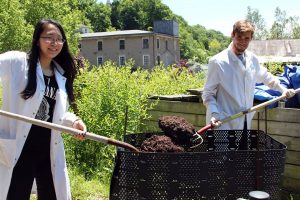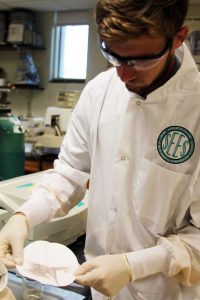An interdisciplinary group of students researching the nitrogen cycle is considering composting as a way to relieve the effects of excess nitrogen on campus and globally.
While not receiving attention on the scale of climate change, issues related to the worldwide nitrogen cycle may be equally significant. Nitrogen is an essential component of many compounds necessary for life, including proteins, DNA, and chlorophyll.

Cathy Ye ’17 and Campbell Weyland ’17 work with organic compost.
But human activity has doubled the amount of nitrogen present naturally in the environment, with fertilizer used to increase plant production accounting for more than half of the nitrogen contributed by humans. Unused nitrogen from fertilizer can leach out of soil and enter streams and rivers, negatively affecting aquatic ecosystems and drinking water.
Leading the student research, which includes an assessment to define the campus’s own nitrogen footprint, are Art Kney, associate professor of civil and environmental engineering; Ben Cohen, assistant professor of engineering studies; and Mary Wilford-Hunt, director of facilities planning.
Environmental studies major Campbell Weyland ’17 (Pewee Valley, Ky.) and civil engineering majors Madhav Bista ’18 (Kathmandu, Nepal), Aliza Furneaux ’17 (Factoryville, Pa.), Yuxiang Shen ’17 (Chengdu, China), and Wenxin Ye ’17 (Beijing, China) are participating in the project. Mickey Adelman ’10 and Diana Hasegan ’10 are serving as co-advisers.

Working in the lab
Beyond assessing Lafayette’s nitrogen footprint, the goal of the project is to better understand the chemistry of nitrogen and phosphorus in the composting process and, in particular, identify techniques by which the nitrogen content of compost might be increased or decreased.
Composting is becoming increasingly important today for its environmental benefits.
The research is expected to address several areas of current interest in environmental science and engineering:
- Water quality. Nutrients in agricultural runoff are an important non-point pollution source, and alternatives to conventional farm fertilizer (such as compost) could lead to water- quality improvements.
- Waste management. Composting is a waste-management tool of growing importance; therefore, a better understanding of how to control movement of nutrients throughout the composting process could lead to improved handling of municipal waste.
- Stormwater quality. As more commercial composters have entered the market to recycle municipal solid waste, the U.S. Environmental Protection Agency has recognized the need to develop new markets for compost. Compost-based stormwater best management practices present an ideal opportunity. Using compost from stormwater basins improves downstream water quality by retaining pollutants such as heavy metals, nitrogen, phosphorus, oil and grease, fuels, herbicides, and pesticides.
- Agriculture. Compost may be limited in its large-scale use in agriculture by its insufficient content of important nutrients for plant growth. Management of the nitrogen cycle, providing a nutrient-rich material, might allow compost to better compare with conventional fertilizer in agricultural effectiveness.
- National Academy of Engineering’s Grand Challenge No. 4: Manage the Nitrogen Cycle. Developing a more sustainable approach to improved nutrient management through engineered composting methods presents a unique consideration to a time-tested natural process. If successful, it would present a sustainable organic alternative to petroleum-based fertilizers as well as a sustainable alternative material for use in stormwater control systems.
Understanding the human contribution to the nitrogen cycle is a necessary prerequisite for developing measures to mitigate and reduce that footprint. As the nitrogen cycle is one of the areas where the chemistry of Earth and life come together, better management of human impact could help restore balance and promote sustainable development.

